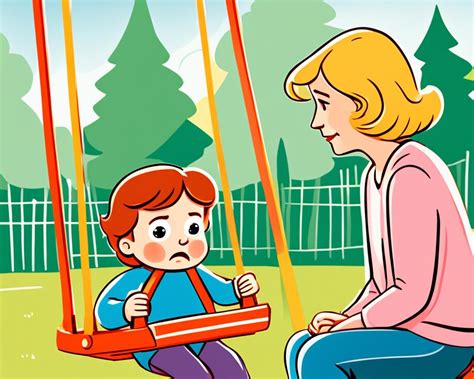As a parent, it can be heartbreaking to realize that your child may resent you. This resentment can manifest in a variety of ways, making it difficult to identify and address. However, understanding the signs and causes of resentment is crucial for repairing the relationship and fostering a positive family dynamic.

Causes of Child Resentment
Resentment in children can stem from various factors, including:
- Unmet emotional needs: Children who feel neglected or unsupported emotionally may develop resentment towards their parents.
- Discipline: Excessive or harsh discipline can create feelings of anger and resentment in children.
- Comparison to others: If children feel they are being unfavorably compared to siblings or peers, they may resent their parents.
- Parental conflict: Children who witness or experience conflict between their parents may feel neglected or resentful.
- Substance abuse: Parents who struggle with substance abuse can create an unstable and harmful environment that fosters resentment in children.
Signs Your Child Resents You
Recognizing the signs of resentment in children is essential for addressing the issue promptly. Some common indicators include:
- Withdrawal: Children may avoid spending time with you or engaging in family activities.
- Hostility: They may exhibit angry or aggressive behavior towards you or other family members.
- Disrespect: Children may question your authority or challenge your decisions.
- Alienation: They may prefer spending time with friends or other adults over their parents.
- Passive-aggressive behavior: Children may engage in subtle actions that indirectly express their resentment, such as sulking or making sarcastic remarks.
Understanding the Impact of Resentment
Child resentment can have serious consequences for both the child and the family. It can:
- Damage the child’s self-esteem
- Hinder their social and emotional development
- Create a strained and unhealthy family environment
- Lead to conflict and alienation within the family
Repairing the Relationship: A Step-by-Step Guide
Addressing child resentment requires a proactive and empathetic approach. Here’s a step-by-step guide for parents:
1. Acknowledge the Resentment:
- Talk to your child openly about your concerns regarding their behavior.
- Listen attentively to their perspective and try to understand their reasons for feeling resentment.
2. Identify the Underlying Causes:
- Explore the possible factors contributing to your child’s resentment.
- Focus on addressing the unmet emotional needs, disciplinary practices, or other issues that may be fueling the resentment.
3. Express Apologies and Validation:
- If you’ve made mistakes or caused your child to feel neglected, apologize sincerely.
- Validate their feelings and let them know that you understand and respect their perspective.
4. Implement Changes:
- Make necessary changes in your parenting approach to address the underlying causes of resentment.
- Consider adjusting your discipline methods, spending more quality time with your child, or seeking professional help if needed.
5. Spend Meaningful Time Together:
- Prioritize spending quality time with your child without distractions.
- Engage in activities they enjoy and make an effort to connect on an emotional level.
6. Encourage Open Communication:
- Establish an open and honest dialogue with your child.
- Encourage them to express their feelings and concerns without fear of judgment or punishment.
Tables of Insight
Table 1: Common Causes of Child Resentment
| Cause | Description |
|---|---|
| Unmet emotional needs | Children feel neglected or unsupported emotionally. |
| Discipline | Excessive or harsh discipline can create feelings of anger and resentment. |
| Comparison to others | Children feel they are being unfavorably compared to siblings or peers. |
| Parental conflict | Children who witness or experience conflict between their parents may feel neglected or resentful. |
| Substance abuse | Parents who struggle with substance abuse can create an unstable and harmful environment that fosters resentment in children. |
Table 2: Signs of Child Resentment
| Sign | Description |
|---|---|
| Withdrawal | Children avoid spending time with you or engaging in family activities. |
| Hostility | They exhibit angry or aggressive behavior towards you or other family members. |
| Disrespect | Children may question your authority or challenge your decisions. |
| Alienation | They prefer spending time with friends or other adults over their parents. |
| Passive-aggressive behavior | Children engage in subtle actions that indirectly express their resentment, such as sulking or making sarcastic remarks. |
Table 3: Steps to Repair Child Resentment
| Step | Description |
|---|---|
| Acknowledge the Resentment | Talk to your child openly about your concerns regarding their behavior. |
| Identify the Underlying Causes | Explore the possible factors contributing to your child’s resentment. |
| Express Apologies and Validation | Apologize sincerely for mistakes and validate their feelings. |
| Implement Changes | Make necessary changes in your parenting approach to address the underlying causes of resentment. |
| Spend Meaningful Time Together | Prioritize spending quality time with your child without distractions. |
| Encourage Open Communication | Establish an open and honest dialogue with your child. |
Table 4: Tips for Improving Communication with Resentful Children
| Tip | Description |
|---|---|
| Use “I” statements | Express your feelings using “I” statements to avoid sounding accusatory. |
| Listen attentively | Give your child the opportunity to express their feelings without interrupting. |
| Validate their perspective | Let your child know that you understand and respect their perspective, even if you don’t agree. |
| Set clear expectations | Explain your expectations in a clear and respectful manner. |
| Follow through with consequences | Enforce consequences fairly and consistently to maintain boundaries. |
Conclusion
Child resentment is a complex issue that requires empathy, patience, and a willingness to address underlying causes. By understanding the signs, identifying the motivations, and implementing effective strategies for repair, parents can rebuild a strong and healthy relationship with their children. Remember, the journey to healing resentment requires time, effort, and a genuine commitment to fostering a positive family environment.
